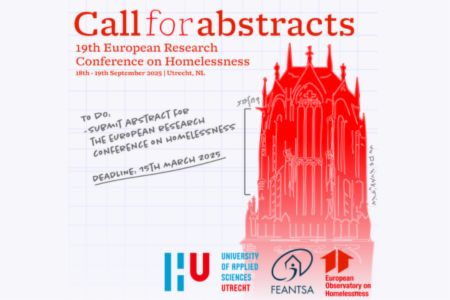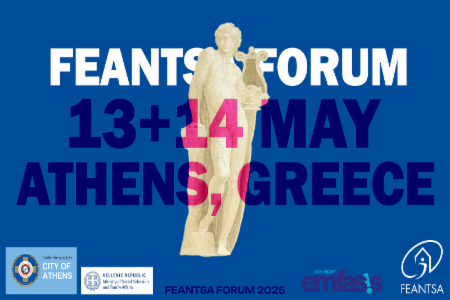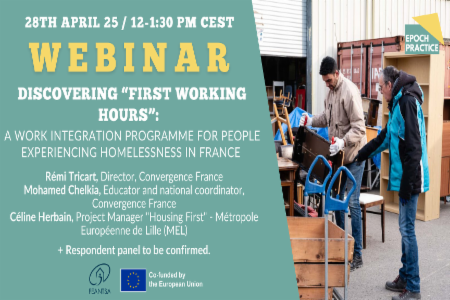Faced with rising living costs, the Foundation Abbé Pierre and FEANTSA forewarn of a surge in rent arrears across Europe

Read the press release here
With the release of the Seventh Overview of Housing Exclusion in Europe in 2022, the Foundation Abbé Pierre and FEANTSA warn of growing arrears in Europe and consequently the risk of an increase in the number of evictions as the exceptional and temporary protection measures adopted during the past two years marked by the pandemic gradually come to an end.
According to a Eurofound survey conducted during the pandemic,[1] 5.4% of households surveyed in March 2021 said that they were at risk of having to leave their home in the next three months because of their inability to pay rent[2].
8.3% of poor households have been in arrears with their rent or mortgage payments across the European Union since the COVID-19 pandemic began. This proportion increased by 20% between 2019 and 2020.[3]
Another factor contributing to the crisis is the surge in the household costs across Europe. Between 2020 and 2021, households faced a 10% increase in their energy bills, against a background of steadily rising rental expenditure over the last decade (up 16% between 2010 and 2021). The increase in living costs has had an unprecedented impact on household budgets, with 31.8% of poor households being overburdened by housing costs in 2020.[4]
These alarm bells raise fears of a surge in evictions with significant social consequences for especially vulnerable households:
- In Spain, over 41,000 evictions took place in 2021 representing an increase of 40% on 2020.
- In Germany, almost 30,000 households were evicted in 2020 despite the pandemic protection measures, equivalent to an average of 81 evictions per day.
- In Ireland, eviction notices rose by 60% between 2020 and 2021 with the number of homeless people climbing by 14% in the six months following the lifting of lockdown measures in April 2021.
- In France, 280,000 power outages for unpaid bills are counted each year.
Although all 27 Member States pledged to end homelessness at the launch of the European Platform on Homelessness in Lisbon in 2021 for the first time in the European Union’s history and the French Presidency of the EU Council outlined a work programme for this new platform, there is still a long way to go. The implementation of the right to housing enshrined in the European Social Charter’s Principle 19 inevitably involves the effective prevention of evictions.
FEANTSA is the European Federation of National Organisations Working with the Homeless. We are the only European NGO focusing exclusively on the fight against homelessness. Our goal is an end to homelessness in Europe. We work with over 115 member organisations from 24 countries. FEANTSA’s members are predominantly NGOs working with homeless people, but also include other stakeholders involved in the fight against homelessness such as public authorities, social housing providers, foundations, and research entities.
Foundation Abbé Pierre is present all over France and works on daily basis to enable all disadvantaged people to have access to decent housing and a dignified life. Its headquarters are located in Paris, and it has 9 territorial agencies (Ile-de-France, Nord Pas-de-Calais, Brittany, Rhône-Alpes, Provence Alpes Côte d'Azur, Réunion Island, Languedoc Roussillon, Alsace Lorraine, Aquitaine).
Press contacts
French:
Angèle Roblot • media@fap.fr • +33 06 23 25 93 79
English:
Rocío Urías • rocio.urias@feantsa.org • +34 674 79 01 01
[1] https://www.eurofound.europa.eu/sites/default/files/wpef20005.pdf
[2] Housing insecurity indicator, Eurofound 2021 – Financial situation and security during COVID-19 : https://www.eurofound.europa.eu/data/covid-19/financial-situation
[3] In the EU27. Eurostat EUSILC, 2022.
[4] Compared to 7.8% of the total population and 3.1% of non-poor households. The housing cost overburden rate is when a household spends more than 40% of its average disposable income on housing costs: housing cost overburden rate by age, sex, and income group - EU-SILC survey [ilc_lvho07a], https://appsso.eurostat.ec.europa.eu/nui/show.do?dataset=ilc_lvho07a&lang=fr





